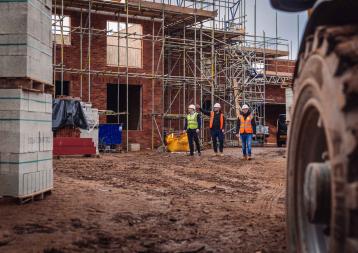State of Play - A comprehensive survey on challenges facing SME's undertaken by Close Brothers and the Home Builders Federation
October 19
8 min read
Frank Pennal, CEO of Close Brothers Property Finance, comments: “The threat to SME housebuilders following the COVID-19 pandemic is clear, and we now have to act to reverse the decline of this vitally important part of the housing market. Not only do SME housebuilders provide a training ground for young apprentices and trainees, they are the lifeblood of regional property markets and safeguard diversity of design, skills and craftmanship within the industry. This research underlines the need to support and protect SME housebuilders, which have consistently demonstrated their value when it comes to economic growth and directly supporting the local communities and micro-markets in which they operate.”
Stewart Baseley, Executive Chairman, HBF, comments: “As we look to boost housing supply post the coronavirus lockdown it is vital we support SME builders such that they can play their part. Increased bureaucracy and regulation and a harsh operating environment has seen the number of SME builders plummet in recent decades. Government needs to work with industry to develop policies that allow SMEs to grow. Doing so will increase housing supply, create jobs and stimulate economies across the country.”
Reduced growth and delivery
When asked about business growth post COVID-19, nearly two thirds of respondents (65%) have said their growth projections are down. Of this figure, 39% of respondents said their growth projections are down between 10-50%, with over a quarter (26%) seeing their growth projections fall between 0-10%.
Help to Buy
Help to buy has been a lifeline to this part of the market with 76% of the survey respondents using the initiative on 39% of their new homes sales (mean average).
The hiatus of construction during the coronavirus lockdown and the inhibition of production capacity due to social distancing measures on sites have inevitably resulted in delays to build programmes. As such, there are thousands of property purchases at risk of falling through as they are ineligible for the new scheme; either because of the purchaser’s eligibility or because of the regional price caps that will come into effect under the new, 2021-23 Help to Buy programme.
Case study:
Kevin Marren, Managing Director at Eccleston Homes, located in the North West of the UK, comments:
“Currently approximately 60-70% of our buyers use Help to Buy, however, under the regional caps the vast majority of our properties (probably over 90%) would fall outside of the new price banding, which is extremely low at £224,400.
“At this price point, first time buyer homes in the North West will inevitably be smaller and there will be much less choice in the market. As first time buyers get older they are increasingly looking for family homes, so it’s unlikely these new regionally capped homes will appeal to buyers.
“While the housing market is currently looking positive, we face having our legs cut out from under us next year, when the stamp duty holiday ends and the regional caps are introduced. We would urge the Government to increase the regional cap to £275,000, as this is in line with the market – not only providing more choice for first time buyers but also enabling the housing market to function properly.”
Planning
Planning continues to be a particular concern when it comes to industry growth and the delivery of homes. Indeed, 83% of respondents cited delays in securing planning permission or discharging of planning conditions by local authorities as a major barrier to increasing housing delivery over the next twelve months. With 73% of SME housebuilders seeing a lack of resource in local authority planning departments as a major barrier. (Ref. Table 1)
SMEs are disproportionately affected by planning setbacks, as they may have their capital tied up in just one or two projects at a time. As a result, lengthy delays can bring their business to a halt.
CBILS
SME developers have had varying degrees of success in accessing the Government’s financial support measures for businesses introduced in the wake of the coronavirus pandemic, with some facing numerous challenges including delays, inconsistent approaches from lenders and a refusal by some to lend to the real estate sector, in their attempts to access financial support.
Just over half of the respondents (53%) have tried to access supports through CBILS and of these, only 44% of respondents had been successful.
Development Finance
In the challenging post-Covid environment, the availability and terms on which development finance is offered to SME developers will continue to be of considerable importance. It is encouraging that development finance was rated as the lowest barrier to growth by SME housebuilders, with 41% not considering this to be a barrier to growth. (Ref. Table 1)
Labour and growth
A third of respondents (33%) do employ apprentices and train new employees, and they make up 19% of their workforce, on average (just under 1 in 5 employees).
Nearly half (48%) of all respondents do not employ apprentices or train new employees, with 19% previously employing apprentices, but not currently.
Table 1
|
Rate the following barriers to your business in terms of increasing housing delivery over the next 12 months |
Major barrier |
Minor barrier |
Not a barrier |
|
Delays in securing planning permission or discharging conditions |
83% |
16% |
1% |
|
Lack of resource in LA's planning departments |
73% |
24% |
3% |
|
Consumer confidence |
45% |
45% |
10% |
|
Effects of COVID-19 – site closures, social distancing etc. |
44% |
51% |
5% |
|
Mortgage availability |
36% |
51% |
14% |
|
Land availability |
32% |
46% |
21% |
|
Development finance |
20% |
39% |
41% |
|
Supply/cost of materials |
20% |
66% |
14% |
|
Supply/cost of labour |
19% |
64% |
18% |
Demographics
-
The majority of respondents (99%) are established businesses, with 74% trading for over 10 years and 25% trading for between 2-10 years
-
The regional demographic is primarily weighted across London (16%) and the South East (48%), but there is also strong representation from the Midlands (14%) and South West (10%)
-
In terms of the size of their businesses, 41% of respondents build between 10-50 units per annum, with a third (33%) building less than 10 units, 15% building between 50-100 units and just 10% building over 100 units per annum
-
Half of respondents (50%) employ less than 10 people directly, with over a third (34%) employing between 10-50 and just 9% employing more than 50 directly
For further information please contact:
David O'Leary, Policy Director at HBF: david.oleary@hbf.co.uk, 07891 167 072
Daniel Joyce, Director at Close Brothers Property Finance: Daniel.Joyce@closebrothers.com, 020 385 76284
About HBF
HBF is the representative body of the home building industry in England and Wales. Our members are responsible for providing around 80% of all new private homes built in England and Wales and most of our members are small or medium-sized enterprises.
About Close Brothers Property Finance
At Close Brothers Property Finance, we are property specialists who provide personalised, flexible finance to property developers and investors across the property industry. Over the last four decades we have consistently supported small and medium sized businesses and we are currently funding over 5,000 homes with a loan book of £1.4 billion. Our bespoke financial products include development finance, bridging loans and commercial investment and our specialist teams are based in three offices across the UK.
We are part of Close Brothers Group plc, which employs over 3,000 people, is listed on the London Stock Exchange and is a member of the FTSE 250. Close Brothers is a leading UK merchant banking group, providing lending, deposit taking, wealth management services and securities trading.
For further information on Close Brothers Property Finance, visit: www.closepropertyfinance.com or for further information Close Brothers Group plc, visit: www.closebrothers.com






